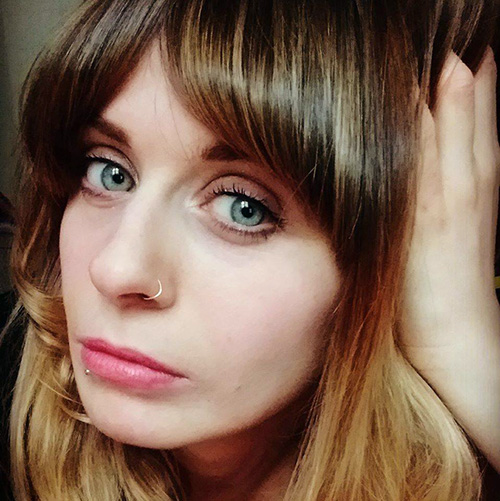ROAR
★ ★ ★ ★
I’M GRAND

By Lorna O’Hara
“But why don’t you want to talk to a therapist?”
Long pause.
“Because…I’m grand”.
I can’t believe the brick wall that I’m repeatedly running up against in this conversation. “I’m grand” — the favourite refrain of an Irish person, even when they’re clearly not grand. Her hair could be on fire and she’d be “grand”. It was no use, the wall was up. She just had that blank look on her face again, the one we were all used to by now.
I had once read a story about an Irish man who, adrift on a boat in the sea, had refused to call the coast guard for help “because he didn’t want to bother anyone”.
She just didn’t want to bother anyone. Yeah, it was a bit like that I guess, she was adrift in her own sea of dark thoughts. The medication had been thrown out to her, the life preserve, she had grabbed hold and hoped it would pull her the rest of the way in, but of course it wouldn’t. And she wasn’t about to attempt to swim after all these years, sure she’d never even learned how. Why would she bother starting now?
There’s a certain amount of this behaviour that’s generational: people of a certain age in Ireland, and elsewhere, have difficulty talking about their mental health and view therapy with a deep suspicion. And would you blame them? We have a history of not wanting to deal with our problems. Ireland is known for locking “inconvenient” people up in institutions: from the Magdalene laundries and mother and baby homes, to today’s direct provision centres. And just like after the beginning of investigations into the mother and baby’s homes in recent years, there have been calls to investigate similar mistreatment in the state’s psychiatric institutions.
People were locked up at an alarming rate in the asylum system during the 1950s in Ireland, a system that had originally developed out of the prison system. In 1951 the town of Ballinasloe, Co. Galway had over 2,100 of its population of 5,600 held in the Ballinasloe Mental Hospital. There was a huge focus on institutional psychiatry and people were often locked up in these asylums for decades. Mortality rates were unusually high when compared with the general population, and numerous, now discredited, practices such as insulin coma therapy (which is exactly what it sounds like) and lobotomies were common place. While practices and attitudes have most certainly changed since then, I still remember people joking about “locking you up in Loman’s” (St. Loman’s being a psychiatric hospital in Mullingar) when I was a kid. And that fear, that stigma of being labelled “unstable” or “crazy” is still, despite more positive discourse around mental health, quite palpable.
But it’s also important to think about the gendered aspect of mental health too. Suicide is an epidemic among young men in Ireland. Expectations around what it means to be a man are a huge factor in this: you must be strong and, for the love of god, do NOT talk about your feelings. In fact, men in Ireland are more likely to come in contact with mental health services through the criminal justice system than through primary care — seriously, it’s that bad. However, while men are three times more likely to die by suicide than women, depression and anxiety are three times more prevalent among women than men. Nowadays I hear a lot of people speaking out about mental health and young men in Ireland. This important, timely and vital discussion is led by popular (and hilarious) figures such as Blindboy Boatclub of The Rubberbandits. I have incredible admiration for him and how well he articulates so many of the problems of my generation as well as wider issues within Irish society, especially mental health. I’ve struggled with depression and anxiety on and off for years now and I still worry about how people view that, and oddly enough, I worry very much about how men view it.
I feel the word “unstable” is often applied to women with mental health disorders: we’re unpredictable, we’re hysterical, who knows what we’ll do? Men, on the other hand, are “troubled”. It doesn’t sound as bad, does it? It sounds almost poetic: “he’s a troubled young man”. Now, I’m not saying that it makes men’s issues any less serious, in fact such expressions almost understate this sense of intense mental anguish. However, I still feel that the way we talk about and judge men and women with mental illness tends to differ, and that matters. When women fly off the handle, start abusing drugs and alcohol or acting in a self-destructive manner, everyone is ready to criticise and name-call: they’re “train wrecks” or “damaged goods”. We have seen examples of this in popular culture, from Britney Spears and Lindsay Lohan, to Amy Winehouse. People seem to love watching women destroy themselves, it’s an absolute spectacle. There’s very little empathy or understanding for women who act out due to mental health problems and I feel that this is just another way to dehumanise us, or in some cases even sexualise us. U.S President Donald Trump once exclaimed that Lindsay Lohan’s poor mental health probably made her “great in bed”. Well, I guess it’s not all bad then, aye ladies?
While women often have better support systems than men and are more likely to seek out treatment for depression and anxiety, I don’t feel that this is true across the board. That’s why I want to go back to the generational issue again, because I wonder do the statistics about mental health take into account the older generation of women in Ireland? The generation of women who, already aware of the possibilities of being locked up in such institutions as the Magdalene laundries, had learned to be silent about anything that might mark them out as “unusual”. These are the women who for decades now have been playing the part of the perfect “Irish mammy”; an eternally self-sacrificing symbol of love and domesticity. This role, which is so often celebrated, is also one that I find to be incredibly sad. The Irish mammy puts everyone first; gives all her children plates piled high with food and leaves nothing for herself. There’s little-to-no room for self-love in such a role, and I’ve seen first-hand the immense sense of guilt that arises when she’s unable to carry out her “duties”. It’s no surprise to me that I’m hearing about more and more older women in their 60’s and 70’s having breakdowns. And what’s more is that they come from a generation that have a deep mistrust of psychiatry because of its past record. Trying to get those women to talk honestly and openly about how they’re feeling or trying to encourage them to seek help can be just as big a challenge as trying to convince a young man. I know this because I’ve had the exact same conversations with men in my life as I’m trying to have with one of the most important women in my life, and I’m being greeted with the same level of resistance.
The New Year brings with it the opportunity to reflect and take stock of our mental health, and it’s encouraging to see more and more people talking openly about depression and anxiety in both men and women. It gives me hope for the future. That perhaps one day if my daughter is sitting across from me, and asks me to look after myself with the same care that I’ve given everyone else my entire life, that I’ll be able to hear her.

Lorna O’Hara is a doctoral student and feminist activist currently living between Berlin and Dublin. Her writing and research focuses on feminist activism and art, in particular similarities/differences between international feminist groups and artistic projects that have a focus on increasing awareness about/changing violence against women and the control of women’s bodies.

DEAR READER
At The Wild Word we are proud to present some of the best online writing around, as well as being a platform for new and emerging writers and artists.
If you have read the work in The Wild Word and like what we do, please put something in our tip jar.
THANK YOU FOR YOUR SUPPORT!
























This is beautifully written! With more attention being paid to mental health issues, I hope we can get more help to more people. Thank you for this.
I’ve never understood the way society has such a terrible double standard on diseases. If you have an arrhythmia or diabetes there are treatments and support, but if you are struggling with a more difficult to understand illness “you are just not trying hard enough.” Your words should be broadcast around the world, screamed from the mountaintop, There is help, and hope.